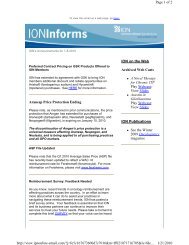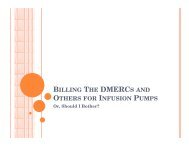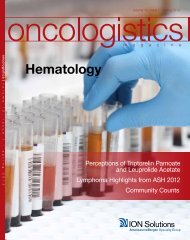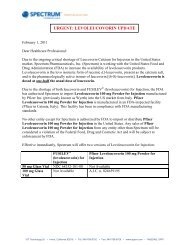First Quarter 2008 - Issues in Hematology - ION Solutions
First Quarter 2008 - Issues in Hematology - ION Solutions
First Quarter 2008 - Issues in Hematology - ION Solutions
- No tags were found...
You also want an ePaper? Increase the reach of your titles
YUMPU automatically turns print PDFs into web optimized ePapers that Google loves.
oncologistics drug updateNEW STUDIES IN VIDAZA ®THERAPY: PROLONGED SURVIVALIN HIGHER-RISK MDS PATIENTS,ALTERNATE DOSING SCHEDULES,AND USE IN AMLby: Lewis R. Silverman, M.D.The U.S. Food and Drug Adm<strong>in</strong>istration (FDA) approvedVidaza (azacitid<strong>in</strong>e) as the fi rst treatment for themyelodysplastic syndrome (MDS) for all FAB subtypes<strong>in</strong>clud<strong>in</strong>g both low-risk and high-risk patients. These FABsubtypes <strong>in</strong>clude: refractory anemia (RA) or refractoryanemia with r<strong>in</strong>ged sideroblasts (RARS) if accompaniedby severe neutropenia (< 1 x 10 9 /L) or thrombocytopenia(< 0.5 x 10 9 /L) or anemia requir<strong>in</strong>g RBC transfusions;refractory anemia with excess blasts (RAEB), refractoryanemia with excess blasts <strong>in</strong> transformation (RAEB-T),and chronic myelomonocytic leukemia (CMMoL).Vidaza is a substituted cytid<strong>in</strong>e nucleoside analog andis believed to exert its ant<strong>in</strong>eoplastic effects by caus<strong>in</strong>ghypomethylation of DNA and direct cytotoxicity onabnormal hematopoietic cells <strong>in</strong> the bone marrow.Vidaza is a hypomethylat<strong>in</strong>g agent and belongs toa new class of anti-cancer compounds known asepigenetic therapies. Epigenetics refers to normalcontrol mechanisms <strong>in</strong> the genome that regulate geneexpression, mediated <strong>in</strong> part by changes <strong>in</strong> DNAmethylation and histone acetylation, two of the morestudied epigenetic regulatory mechanisms. Epigeneticchanges <strong>in</strong> cancer cells and other states can aberrantlysilence gene expression and, unlike DNA mutations,may be reversed by target<strong>in</strong>g the mechanisms <strong>in</strong>volved.Thus, an epigenetic approach to cancer therapy isdesigned to reactivate silenced genes through targetedtherapy, re-establish<strong>in</strong>g the cancer cells’ naturalmechanisms to control abnormal growth result<strong>in</strong>g <strong>in</strong> areversal of the malignant phenotype. By <strong>in</strong>hibit<strong>in</strong>g DNAmethyltransferase and thus revers<strong>in</strong>g hypermethylation,Vidaza may restore normal expression of silenced genescritical to cell differentiation and proliferation. The drugalso appears to exhibit its effects, through directtoxicity, when cells are undergo<strong>in</strong>g DNA synthesis <strong>in</strong>S phase. Because all cells are not <strong>in</strong> the same phasesimultaneously, longer treatment time will expose morerapidly divid<strong>in</strong>g cells to Vidaza. Vidaza therapy alsocauses the death of rapidly divid<strong>in</strong>g cancer cells nolonger responsive to normal growth control mechanisms.The benefi ts of Vidaza therapy <strong>in</strong> MDS have long beenknown, however, recent studies have shown new resultsnot previously recognized. Trials demonstrat<strong>in</strong>g <strong>in</strong>creasedsurvival <strong>in</strong> higher-risk MDS patients as comparedto conventional regimens, effective alternate dos<strong>in</strong>gschedules <strong>in</strong> MDS patients with lower risk disease, andeffectiveness <strong>in</strong> acute myeloid leukemia (AML) patientshave generated additional and <strong>in</strong>creased <strong>in</strong>terest <strong>in</strong>Vidaza therapy throughout the oncology community.oncologistics 31














